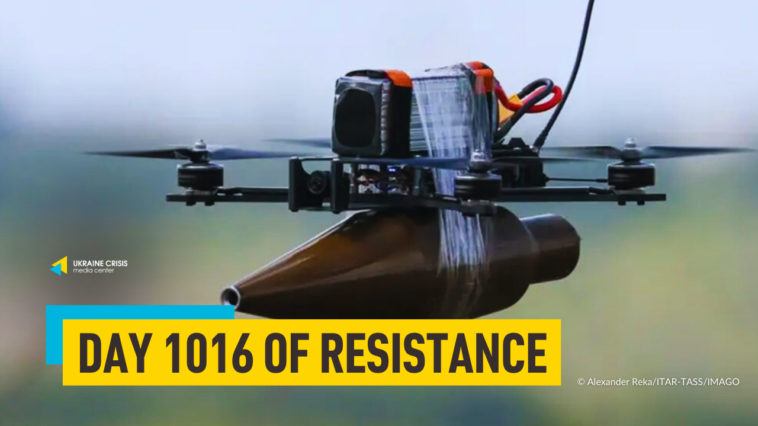Zelenskyi reiterates importance of a NATO invitation to Ukraine in a phone call with the NATO chief. Russia uses civilians as “target practice” for killer drones, the Financial Times reveals in a report. Ukraine will not settle for Yalta-2 or Minsk-3 peace deals, Ukraine’s Foreign Minister says.
Zelenskyi reiterates importance of NATO invitation to Ukraine in phone call with NATO chief
In a phone call with NATO Secretary General, Mark Rutte, on Thursday, President Zelenskyi reiterated the importance of extending an invitation to Ukraine to join NATO. He also thanked Rutte for hosting a meeting of the NATO-Ukraine Council in Brussels at the level of foreign ministers.
“I reiterated the importance of inviting Ukraine to NATO and ensuring the timely reinforcement of our combat brigades with ammunition, weapons, and equipment, as well as strengthening Ukraine’s defense against Russian air terror this winter,” Zelenskyi said on X.
“We coordinate our positions to bring closer a just and stable peace, as supporting Ukraine is crucial not only for our country but for all partners in Europe, because the security of one is the foundation for the security of all,” he added.
Earlier this week, the Ukrainian Foreign Ministry said in a statement that Ukraine will not settle for any security guarantees other than full NATO membership.
Ukraine is not making a push for NATO membership as some nations oppose the idea, Ukrainian Foreign Minister, Andriy Subiha told reporters on the sidelines of the NATO Foreign Ministerial in Brussels on Wednesday.
Russia uses civilians as “target practice” for killer drones, Financial Times reveals
Russia trains new drone operators and refines their combat techniques by targeting Ukrainian civilians with drones, a Financial Times report from Kherson reveals. The paragraphs below are quoted from the article.
Kherson’s civilians have been, since midsummer, the target of an experiment without precedent in modern European warfare: a concerted Russian campaign to empty a city by stalking its residents with attack drones.
The killer machines, sometimes by the swarm, hover above homes, buzz into buildings and chase people down streets in their cars, riding bicycles or simply on foot. The targets are not soldiers, or tanks, but civilian life.
“They are hunting us,” said Oleksandr Prokudin, head of the Kherson regional military administration. “Imagine what that does to a person, the psychological impact.”
Since mid-July, Kherson and its neighbouring villages along the western side of the Dnipro river have suffered more than 9,500 attacks with small drones, killing at least 37 people and injuring hundreds more, according to Prokudin, regional prosecutors and police.
Prokudin told the Financial Times that Russia had deployed some of its “best drone units” across the Dnipro river, which bisects Kherson and serves as the front line.
From the bank opposite the city centre, he said, the Russians were launching advanced drone models, refining combat techniques and training new operators for their intensifying invasion.
Scores of videos of drone attacks on civilians are posted on Russian military and pro-war Telegram channels. The Eyes on Russia project by the Centre for Information Resilience (CIR), a London-based non-profit focused on exposing human rights abuses and war crimes, analysed and verified 90 of them in a new report.
The CIR found that the “overwhelming majority” of attacks were either against moving or stationary vehicles — targets that are “difficult to replicate in a test environment”.
The suspicion, on the Ukrainian side, is that Kherson was also being used for “target practice”, Prokudin and other officials said.
The devices used, including first-person view (FPV) drones, Chinese over-the-counter Mavics and sometimes larger Russian military Lancets, zero in on vulnerable, everyday locations: crowded markets, petrol stations, cafés, post offices and humanitarian aid centres.
The drone attacks have accelerated a civilian exodus from the area. Kherson region’s 1mn population has plummeted to just 158,000 since Russia’s invasion. Kherson city had 250,000 residents; today, there are just 60,000.
Ukraine will not settle for Yalta-2 or Minsk-3 peace deals, Ukraine’s Foreign Minister says
Russia wants “a second Yalta or at least a third Minsk,” Ukrainian Foreign Minister Andriy Sybiha said at the OSCE Ministerial Council in Malta on Thursday, referring to the 1945 Yalta Conference and the Minsk accords from 2014 and 2015. Ukraine will never accept such a peace, he added.
“As long as Russia violates OSCE principles and commitments, this organization should remain a platform for Russia’s accountability,” Sybiha said.
Malta hosts the Ministerial Council in Valletta on December 5-6 that brings together foreign ministers and senior officials of the 57 OSCE participating States. Ukraine’s Foreign Minister Andriy Sybiha and the U.S. Secretary of State Antony Blinken are among the participants.
Sybiha and scores of diplomats walked out of the room for the speech of Russian Foreign Minister Sergei Lavrov. Sybiha, in his comments, called Lavrov a “war criminal.”
Tuesday marked 30 years since the Budapest Memorandum was signed. Ukraine will not accept “any alternatives, surrogates or substitutes for Ukraine’s full membership in NATO,” the Ukrainian Foreign Ministry said in a statement that day.
The Yalta Conference took place on February 4–11, 1945. At Yalta, leaders of the U.S., the UK, and the Soviet Union made important decisions regarding the postwar world. They agreed that the Polish eastern border would follow the Curzon Line, and Poland would receive territorial compensation in the west from Germany. Poland’s new government would be called the Polish Provisional Government of National Unity and would include various political groups. It had already been decided that Germany would be divided into occupied zones administered by U.S., British, French, and Soviet forces. The determination of reparations was assigned to a commission.




